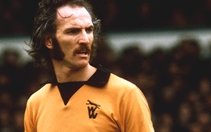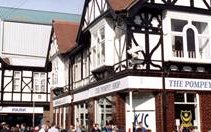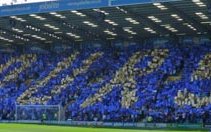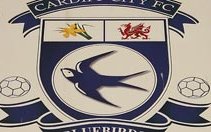Today would have been Derek Dougan’s seventieth birthday.
To mark this and his inclusion in 007’s Pompey team of all time I have written this short account of his very colourful career. Shaven headed footballers and shirt sponsorship are commonplace in the modern game but Derek Dougan led the way with both.
Born Alexander Derek Dougan on 20th January 1938 in East Belfast he played his early football on the streets of his poverty stricken city.
It was as a centre-half that he played for Northern Ireland as a schoolboy and at the age of 15 he signed for west Belfast club Distillery. In 1956 he helped beat his boyhood team Glentoran in the Irish Cup Final (after two replays).
This success was spotted by many English clubs and he eventually signed for Pompey in August 1957 for £4,000. Shortly after his arrival Ray Crawford chipped a bone in his ankle and the ‘Doog’, having now been converted to a centre forward was given his chance to make his league debut. The task was daunting however as Pompey faced the champions, Manchester United, at Old Trafford. Pompey came good that day and romped home by three goals to nil; the last time Pompey got any result at United. Four games later, Derek scored his first League goal in a 1-1 draw at Fratton Park against, ironically, Wolves. During that first season he played up front with Ray Crawford.
One regret that Derek would have had was that Northern Ireland’s first World Cup experience game too early for him. It was of course in 1958 when all the home nations qualified for the tournament in Sweden. Dougan made his debut as a raw 20 year old against Czechoslovakia in a game the Irish won 1-0. Although he did not disgrace himself how much better it would have been if it had come round later in his career.
After returning from the World Cup Dougan began the first of a number of long running feuds with his managers. The target was Freddie Cox who Derek did not see eye to eye with on many subjects primarily the training methods being used. During that season Derek lost his place to the newly signed Ron Saunders and before Pompey’s relegation at the end of the 1958/59 season, he was sold to Blackburn Rovers for £11,000. In total he had played 33 games for Pompey scoring 9 goals.
It was at Blackburn that he picked up the nickname ‘Cheyenne’ because of his likeness to Clint Walker who starred in the TV series around those times. He continued though to be a rebel around the training ground and after reaching the Cup Final in 1960 Dougan shocked the club.
On the morning of the final he put in a transfer request and despite carrying a leg injury, declared himself fit for the game. He had felt his team mates would carry him through the game but after 10 minutes was limping heavily. Soon after Dave Whelan broke a leg and with no substitutes Rovers were effectively down to nine men. Wolves were the benefit that day with an easy 3-0 win.
Dave Whelan was the same Whelan that is now owner of Wigan Athletic and the JJB Sports empire. One of a rare breed a footballer who made a million but not from playing!
It was in 1961 that Derek Dougan first shaved off his dark locks as a sign of rebellion against the game. His career then took him to Aston Villa for £15,000 in July where he replaced Inter Milan bound Gerry Hitchens; after a stormy relationship with manager Joe Mercer he was dropped from the League Cup final of 1963 with neighbours Birmingham City and was off again.
This time it was a move down the divisions to Peterborough for £21,000 in the summer of 63. The Irishman for once got on well with a manager, Gordon Clark and scored 38 goals in two seasons with the Posh. But in the summer of 1965 it was back to Division One with Leicester City for £25,000. He was an instant hit at Filbert Street and in 68 games netted 35 goals before to the dismay of the Foxes fans he was sold to promotion pushing Wolves in March 1967 for £50,000.
Wolves are the club most people remember the ‘Doog’ for and he had quite a remarkable record there. After clinching promotion his career went from strength to strength. He had at last found a club he could settle at and stayed until the end of his career in 1975. In 258 league games he scored 95 goals and in all games managed to hit the target 123 times.
He had a number of different strike partners Hughie Curran, Alun Evans, Peter Knowles and John Richards. Of those Richards was the most proficient and under Derek’s watchful eye went on to play for England on one occasion and become Wolves’ record goal scorer (later broken by Steve Bull). As an aside and mentioning Peter Knowles – how many of you remember how he celebrated scoring the winner at Fratton Park in February 1967 in a 3-2 victory? You need not have been at the game as it was on Match of the Day!!
1971/72 was Derek’s best season at the Wolves, he finished as the club’s top scorer, when he netted 24 times. That season the team reached the final of the UEFA Cup, due to the scintillating attacking football they played. Wolves beat Juventus on the way to the Final, but lost 3-2 to Spurs over two legs.
Two years later, however, Dougan enjoyed his finest moment with the club. Wolves reached the League Cup Final and faced a multi talented Manchester City side that boasted the talents of Denis Law, Rodney Marsh, Francis Lee and Colin Bell, Wolves were given little chance. However goals from Richards and Kenny Hibbitt gave them a deserved 2-1 victory.
After his retirement from League football he had two years as Player/Manager at Kettering Town and while there he introduced shirt sponsorship.
His bold anti-establishment nature led to Dougan making an exceptionally effective and innovative chairman of the Professional Footballers’ Association between 1970 and 1978. He returned to Wolves as Chief Executive in 1982 to save the club thought to be within days of folding. The rejuvenation he promised never materialised and in 1985 he resigned. The next year Wolves completed their slide to the basement of English football and the Wolverhampton love for Dougan died.
In December 2005, he was one of the coffin carriers at George Best’s funeral. Sadly Derek died last June aged 69 but anyone who saw him play will never forget him.
Written by eastneydave.
To join the Vital Pompey debate – in the forum or with comments on articles – simply take a few seconds to register an account.



